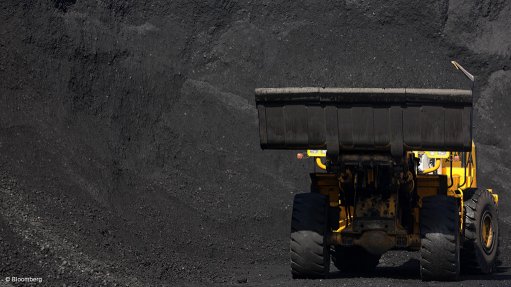
Photo by: Bloomberg
TORONTO (miningweekly.com) – Canada’s largest diversified miner Teck Resources has cut its twice-yearly dividend by two-thirds as lower commodity prices and weakening Chinese metallurgical coal demand weighed on the Vancouver-based company’s first-quarter results.
Teck on Tuesday announced an eligible dividend of $0.15 a share on its outstanding Class A common and Class B subordinate voting shares, to be paid on July 2.
CEO Don Lindsay explained in an analyst conference call that the reduction brought the dividend pay-out and yield more in line with current commodity prices and outlook and ensured balance sheet strength and flexibility for future capital expenditures or other capital allocation opportunities.
In US dollar terms, overall prices were down 24% and margins were down 25% since the company raised the semi-annual dividend to $0.45 a share in the fourth quarter of 2012. “We believe this is an appropriate level in light of current market conditions as it preserves flexibility in funding our development projects and preserves flexibility on our balance sheet,” he said.
For the three months ended March 31, the TSX- and NYSE-listed metallurgical coal, copper and zinc producer reported net profit attributable to shareholders of $68-million, or $0.12 a share, compared with $69-million, or $0.12 a share, in the same period last year.
Excluding special items, Teck reported adjusted profit of $64-million, or $0.11 a share, down 40% year-on-year when compared with $105-million, or $0.18 a share, in the first quarter of 2014.
Wall Street analysts on average expected adjusted earnings of $0.15 a share on revenue of $2.11-billion.
Teck’s consolidated revenues for the period were $2.02-billion, slightly lower than the $2.08-billion reported a year earlier.
In the quarter, compared with the year-earlier period, coal sales rose to 6.8-million tonnes from 6.2-million tonnes, copper sales fell to 71 000 t from 83 000 t, refined zinc sales rose to 73 000 t from 62 000 t and zinc-in-concentrate sales rose to 152 000 t from 148 000 t.
Realised prices for coal fell 20% to $106/t, copper prices fell 17% to $2.64/lb and zinc rose to $0.94/lb, up from $0.92/lb.
WEAKENING MARKETS
Teck noted that commodity markets continued to be challenging. Prices for steelmaking coal had fallen further since the start of the year and the market for steelmaking coal remained oversupplied, mainly owing to indications of weakening demand in China.
The company expected coal sales in the second quarter to be about six-million tonnes.
“Although demand remains good outside of China, downward trending price assessments may be delaying purchasing decisions in other markets, which could affect sales for the quarter,” Teck warned.
Copper prices dipped sharply in the first quarter but rebounded substantially towards the end of the quarter with prices averaging $2.64/lb, compared with $3.19/lb in the previous year.
Partly offsetting the commodity price declines was a stronger US dollar. The stronger US dollar had a significant positive benefit on Teck’s business, as product sales were denominated in the currency, while a significant portion of its expenses were incurred in local currencies, particularly the Canadian dollar and the Chilean peso. At current commodity prices, each one-cent decline in the US/Canadian dollar exchange rate, had an effect on Teck's yearly earnings before interest, taxes, depreciation and amortisation of about $52-million, depending on sales volumes.
A bright spot in Teck’s commodity portfolio was zinc, which prompted the company to restart the Pend Oreille zinc mine, in north-eastern Washington in December. The company expected the operation to benefit from improving zinc market fundamentals and would provide transportation cost savings owing to its proximity to Teck’s Trail operations. The operation was expected to reach full production of 44 000 t/y of zinc metal by the second quarter.
Meanwhile, Teck was pushing ahead with investments for its 20% stake in the C$13.5-billion Fort Hills oil sands project controlled by its partner Suncor. In October 2013, the company approved its share of about C$2.9-billion to complete construction of the oil sands project, of which about $2-billion remained to be spent at the end of March.
Teck’s liquidity remained strong with a cash balance of $1.4-billion at April 20 and $3-billion available under its revolving credit facility, which would mature in 2019.
COLLECTIVE AGREEMENTS
Teck also advised that bargaining was currently under way to renew collective agreements at its British Columbia-based Coal Mountain and Line Creek operations, which expired last year.
The collective bargaining agreements at its Elkview coal operation and at the Peruvian Antamina, Carmen de Andacollo and Quebrada Blanca copper operations would also expire in the third and fourth quarters of this year. Therefore, the miner cautioned that it might be subject to labour unrest or other disturbances as a result of delays in, or the failure of, negotiations of new contracts, which could limit its ability to maintain coal or copper output as expected.
“If this were to occur, the potential shortfall in planned production could be material,” the company said.
Teck’s NYSE-listed stock trended lower on Tuesday, down 7% at $12.90 apiece.